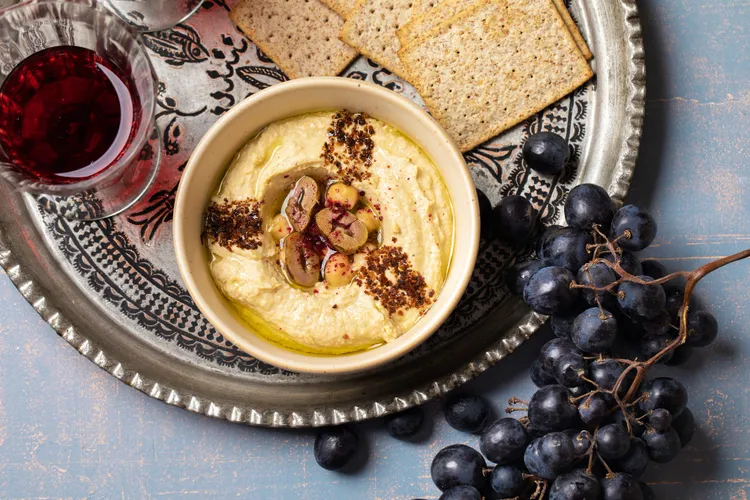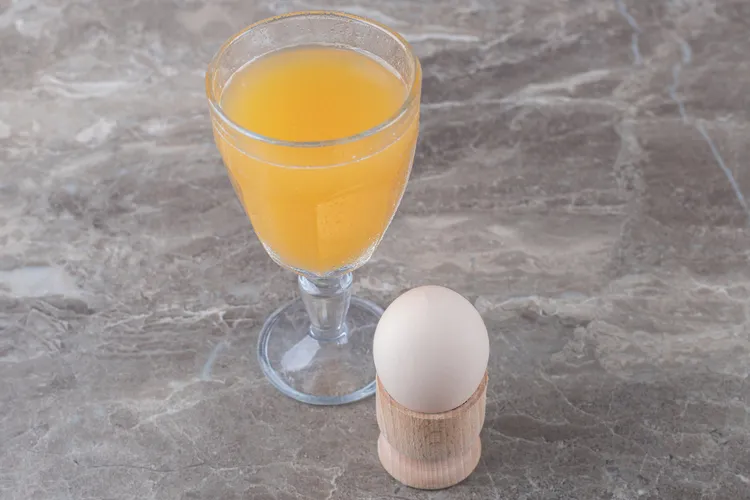10 Foods That Naturally Balance Cortisol: Taming Stress for a Healthier You
Cortisol, often dubbed the "stress hormone," plays a vital role in your body’s response to stress, regulating metabolism, blood sugar, and inflammation. However, chronically elevated cortisol - driven by stress, poor sleep, or an unbalanced diet - can wreak havoc, leading to weight gain, fatigue, anxiety, and even chronic diseases like diabetes or heart disease. While lifestyle changes like exercise and mindfulness are key to managing cortisol, your diet is a powerful tool for keeping this hormone in check. Let’s discover how to nourish your body and tame stress, one bite at a time!

Understanding Cortisol and Its Impact
Cortisol is produced by the adrenal glands in response to stress, whether physical (like exercise) or psychological (like work pressure). It helps mobilize energy stores, regulate blood sugar, and manage inflammation, but too much cortisol over time can lead to:
- Weight Gain: Especially visceral fat around the belly, as cortisol promotes fat storage.
- Fatigue: Disrupts energy regulation, leaving you drained.
- Mood Issues: Contributes to anxiety, irritability, or depression.
- Weakened Immunity: Suppresses immune function, increasing illness risk.
- Hormonal Imbalances: Affects insulin, thyroid, and reproductive hormones.
Diet plays a critical role in modulating cortisol. Foods rich in specific nutrients - like antioxidants, healthy fats, and complex carbohydrates - can stabilize cortisol production, reduce inflammation, and support adrenal health. Below are 10 foods that naturally balance cortisol, along with why they work and how to enjoy them.
- Fatty Fish (Salmon, Mackerel, Sardines)
Why It Helps: Fatty fish are rich in omega-3 fatty acids, which reduce inflammation and lower cortisol levels. Studies show omega-3s can blunt the cortisol response to stress, improving mood and reducing anxiety. They also support brain health, countering cortisol’s negative effects on cognition.
Science Spotlight: A 2018 study in Nutritional Neuroscience found that omega-3 supplementation reduced cortisol levels in stressed individuals by improving the body’s stress response.
How to Enjoy:
- Grill salmon with lemon and herbs for a simple dinner.
- Add canned sardines to salads or whole-grain toast.
- Make a mackerel pate with Greek yogurt and spices for a snack.
Tip: Aim for 2-3 servings (3-4 ounces each) of fatty fish weekly. Choose wild-caught fish when possible to minimize contaminants.
- Dark Chocolate (70%+ Cocoa)
Why It Helps: Dark chocolate contains flavonoids, antioxidants that reduce oxidative stress and lower cortisol production. It also boosts serotonin, a mood-stabilizing neurotransmitter, helping to counteract stress. The small amount of caffeine in dark chocolate can enhance focus without spiking cortisol like high-caffeine drinks.
Science Spotlight: A 2019 study in Nutrients showed that consuming 40 grams of dark chocolate daily reduced cortisol levels in stressed adults.
How to Enjoy:
- Snack on 1-2 squares of 70%+ dark chocolate as a treat.
- Add cocoa powder to smoothies or oatmeal for a chocolatey boost.
- Make a chia pudding with unsweetened cocoa and almond milk.
Tip: Stick to small portions (1 ounce daily) to avoid excess sugar or calories, and choose brands with minimal added sugars.
- Berries (Blueberries, Strawberries, Raspberries)
Why It Helps: Berries are packed with vitamin C and antioxidants, which combat oxidative stress caused by high cortisol. Vitamin C also supports adrenal gland function, helping regulate cortisol production. Their fiber content stabilizes blood sugar, preventing cortisol spikes triggered by glucose fluctuations.
Science Spotlight: Research in The Journal of Nutrition (2017) found that vitamin C supplementation reduced cortisol responses during acute stress.
How to Enjoy:
- Add a handful of berries to Greek yogurt or oatmeal.
- Blend into a smoothie with spinach and protein powder.
- Freeze berries for a refreshing, low-calorie snack.
Tip: Aim for 1-2 cups daily, fresh or frozen, to maximize antioxidant benefits without excess sugar.
- Avocados
Why It Helps: Avocados are rich in healthy monounsaturated fats, potassium, and magnesium, all of which support adrenal health and reduce cortisol. Potassium helps regulate blood pressure, countering cortisol’s hypertensive effects, while magnesium promotes relaxation and better sleep.
Science Spotlight: A 2020 study in Nutrients linked magnesium intake to lower cortisol levels and improved stress resilience.
How to Enjoy:
- Spread avocado on whole-grain toast with a sprinkle of chili flakes.
- Add diced avocado to salads or tacos for creamy texture.
- Blend into a green smoothie with kale and banana.
Tip: Include half an avocado daily for a nutrient-dense fat source. Pair with protein to enhance satiety.
- Leafy Greens (Spinach, Kale, Swiss Chard)
Why It Helps: Leafy greens are loaded with magnesium, folate, and antioxidants, which help regulate cortisol and reduce inflammation. Folate supports neurotransmitter production, improving mood, while magnesium calms the nervous system, mitigating stress responses.
Science Spotlight: A 2018 study in Frontiers in Psychology found that higher magnesium intake was associated with lower cortisol levels and better stress management.
How to Enjoy:
- Sauté spinach with garlic and olive oil as a side dish.
- Blend kale into a smoothie with berries and almond milk.
- Toss Swiss chard into soups or stir-fries for added nutrients.
Tip: Aim for 2-3 cups of leafy greens daily, rotating varieties to diversify nutrient intake.
- Nuts and Seeds (Almonds, Walnuts, Chia Seeds)
Why It Helps: Nuts and seeds provide healthy fats, protein, and magnesium, which stabilize blood sugar and reduce cortisol. Walnuts, in particular, contain omega-3s, while chia seeds offer fiber to prevent blood sugar spikes that trigger cortisol release.
Science Spotlight: A 2019 study in The American Journal of Clinical Nutrition showed that walnut consumption reduced stress-related cortisol spikes.
How to Enjoy:
- Snack on a small handful (1 ounce) of almonds or walnuts.
- Sprinkle chia seeds on yogurt or oatmeal for added fiber.
- Make a trail mix with nuts, seeds, and a few dark chocolate chips.
Tip: Stick to 1-2 ounces daily to avoid excess calories, and choose unsalted, raw varieties to minimize sodium.
- Whole Grains (Oats, Quinoa, Brown Rice)
Why It Helps: Complex carbohydrates in whole grains provide steady energy, preventing blood sugar crashes that spike cortisol. They also boost serotonin production, promoting calm and reducing stress. Oats, in particular, contain beta-glucans, which support immune health.
Science Spotlight: A 2021 study in Nutritional Neuroscience found that complex carbs reduced cortisol levels compared to refined carbs in stressed individuals.
How to Enjoy:
- Start the day with oatmeal topped with berries and nuts.
- Use quinoa as a base for salads or buddha bowls.
- Pair brown rice with lean protein and veggies for a balanced meal.
Tip: Aim for 1-2 servings (1/2 cup cooked) daily, and avoid refined grains like white rice, which can spike blood sugar.
- Fermented Foods (Yogurt, Kefir, Sauerkraut)
Why It Helps: Fermented foods support gut health, which is linked to cortisol regulation via the gut-brain axis. A healthy gut microbiome reduces inflammation and improves stress resilience. Probiotics in yogurt and kefir also support mood by influencing neurotransmitter production.
Science Spotlight: A 2020 study in Nutrients found that probiotic consumption lowered cortisol levels and improved mood in stressed adults.
How to Enjoy:
- Choose plain Greek yogurt with live cultures and add fruit for sweetness.
- Sip kefir as a smoothie base or standalone drink.
- Add sauerkraut to sandwiches or salads for a tangy crunch.
Tip: Aim for 1-2 servings daily, choosing unsweetened, minimally processed options to avoid added sugars.
- Green Tea
Why It Helps: Green tea contains L-theanine, an amino acid that promotes relaxation and reduces cortisol without causing drowsiness. Its antioxidants, like EGCG, also combat oxidative stress linked to chronic cortisol elevation.
Science Spotlight: A 2017 study in Journal of Physiological Anthropology showed that L-theanine reduced cortisol responses during stress tasks.
How to Enjoy:
- Sip 1-2 cups of green tea daily, hot or iced.
- Add a splash of lemon for extra vitamin C.
- Use matcha powder in smoothies or lattes for a concentrated dose.
Tip: Limit to 2-3 cups daily to avoid excess caffeine, which can raise cortisol if overconsumed.
- Legumes (Lentils, Chickpeas, Black Beans)
Why It Helps: Legumes are rich in fiber, protein, and B vitamins, which stabilize blood sugar and support adrenal health. B vitamins, especially B6, are crucial for neurotransmitter production, helping regulate mood and stress responses.
Science Spotlight: A 2019 study in Nutrition Journal linked higher B vitamin intake to lower cortisol levels and improved stress management.
How to Enjoy:
- Make a lentil soup with veggies and spices for a hearty meal.
- Roast chickpeas with olive oil and paprika for a crunchy snack.
- Add black beans to salads or tacos for protein and fiber.
Tip: Aim for 1-2 servings (1/2 cup cooked) daily, rinsing canned legumes to reduce sodium.
Why These Foods Work: The Science of Cortisol Regulation
These foods balance cortisol through several mechanisms:
- Blood Sugar Stability: Fiber and complex carbs (e.g., whole grains, legumes) prevent glucose spikes that trigger cortisol release.
- Anti-Inflammatory Effects: Antioxidants (e.g., in berries, dark chocolate) reduce inflammation caused by chronic stress.
- Adrenal Support: Nutrients like magnesium, vitamin C, and B vitamins (e.g., in leafy greens, avocados) support adrenal gland function.
- Gut-Brain Axis: Probiotics and fiber (e.g., in fermented foods, legumes) improve gut health, influencing stress responses.
- Neurotransmitter Balance: Omega-3s, L-theanine, and B vitamins (e.g., in fish, green tea) enhance mood-regulating neurotransmitters like serotonin.
Health Risks of High Cortisol
Chronic cortisol elevation can lead to:
- Weight Gain: Visceral fat accumulation, especially around the midsection.
- Insulin Resistance: Increased diabetes risk due to impaired glucose regulation.
- Heart Disease: Elevated blood pressure and cholesterol from cortisol’s effects.
- Mental Health Issues: Anxiety, depression, or cognitive decline.
- Weakened Immunity: Higher susceptibility to infections.
Balancing cortisol through diet can mitigate these risks, improving overall health and resilience.
How to Incorporate These Foods into Your Routine
- Start Your Day Right: Try oatmeal with berries and chia seeds or Greek yogurt with walnuts for a cortisol-lowering breakfast.
- Snack Smart: Keep nuts, dark chocolate, or roasted chickpeas on hand for stress-busting snacks.
- Balance Meals: Combine protein (e.g., salmon), complex carbs (e.g., quinoa), and healthy fats (e.g., avocado) for stable energy.
- Hydrate with Purpose: Pair meals with green tea or water to support hydration and cortisol regulation.
- Plan Ahead: Batch-cook lentils or roast veggies to make cortisol-friendly meals convenient.
- Limit Cortisol Spikes: Avoid high-sugar foods, excessive caffeine, and processed carbs, which can elevate cortisol.
Lifestyle Tips to Complement Your Diet
Diet is just one piece of the puzzle. To maximize cortisol balance:
- Exercise Moderately: Aim for 150 minutes of moderate exercise (e.g., walking, yoga) weekly, but avoid overtraining, which can raise cortisol.
- Sleep Well: Get 7-9 hours of quality sleep to regulate cortisol rhythms.
- Practice Mindfulness: Meditation, deep breathing, or journaling can lower stress and cortisol.
- Limit Caffeine: Cap coffee at 1-2 cups daily, as excess caffeine can spike cortisol.
Harness Food to Balance Cortisol
High cortisol can silently undermine your health, but the right foods can help you regain control. By incorporating fatty fish, dark chocolate, berries, and other nutrient-packed options, you can naturally balance cortisol, reduce stress, and boost overall well-being. Pair these foods with a balanced lifestyle - exercise, sleep, and mindfulness - for maximum impact. Your body and mind deserve nourishment that supports resilience, not stress.









